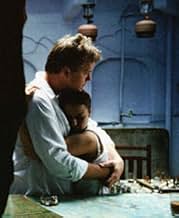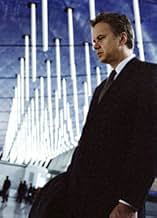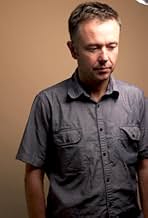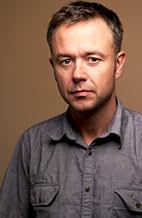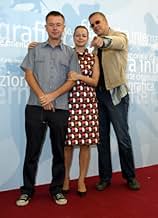IMDb-BEWERTUNG
6,1/10
21.591
IHRE BEWERTUNG
Der futuristische Brief Encounter (1945) ist eine Liebesgeschichte, in der die Romanze durch genetische Unverträglichkeit zum Scheitern verurteilt ist.Der futuristische Brief Encounter (1945) ist eine Liebesgeschichte, in der die Romanze durch genetische Unverträglichkeit zum Scheitern verurteilt ist.Der futuristische Brief Encounter (1945) ist eine Liebesgeschichte, in der die Romanze durch genetische Unverträglichkeit zum Scheitern verurteilt ist.
- Regie
- Drehbuch
- Hauptbesetzung
- Auszeichnungen
- 4 Gewinne & 10 Nominierungen insgesamt
Taro Bahar
- Jim
- (as Taro Sherabayani)
Empfohlene Bewertungen
First of all I was impressed by the moody shots of Shanghai and the other locations used. Almost had that Blade Runner feel for planting you in a believable future. So many films of this genre, and with massively higher budgets, often fail to achieve the lightness of touch shown here. Not the usual obviously nailed-on FX, but instead subtle and credible gizmos with the personalised touch, like Maria's cuckoo-call tone and graphics on her personal organiser that William uses when trying to find her. And the Esperanto-style combination of phrases everyone uses, from Spanish, French, Chinese etc could easily be envisaged in years to come.
But what really let it down ultimately was the story. Just at the point where you wanted the narrative to move up a gear, instead it just hung there and became a bit self-indulgent. The actors made an excellent job of an often dull script. Maybe the writer couldn't think how to end it. A shame, as it was an opportunity squandered in my opinion.
I got the feeling that Frank Cottrell Boyce, though coming up with some thought - provoking ideas in this film and having done excellent work elsewhere, possibly needed to have collaborated with another writer that could have injected some pace and fresh perspective just at the point the film ran out of steam. I'm a great fan of Michael Winterbottom's (especially on "Jude")evocative and atmospheric camera-work, but that alone couldn't salvage the film from ultimately being disappointing.
But what really let it down ultimately was the story. Just at the point where you wanted the narrative to move up a gear, instead it just hung there and became a bit self-indulgent. The actors made an excellent job of an often dull script. Maybe the writer couldn't think how to end it. A shame, as it was an opportunity squandered in my opinion.
I got the feeling that Frank Cottrell Boyce, though coming up with some thought - provoking ideas in this film and having done excellent work elsewhere, possibly needed to have collaborated with another writer that could have injected some pace and fresh perspective just at the point the film ran out of steam. I'm a great fan of Michael Winterbottom's (especially on "Jude")evocative and atmospheric camera-work, but that alone couldn't salvage the film from ultimately being disappointing.
I loved this film! It was (to my cinematographically uncultured palate, at least) different, and the characters seemed quite unconventional. Rather than just hollow acting, I found Tim Robbins' character to be a mental curve ball, which completely altered the way the film played out. It hinted at the socialisation and culture prevalent at the time.
I also enjoyed the (much-disputed) foreign terms slipped into the conversation - they weren't too frequent, and added a dimension - that there had been purely aesthetic as well as techno/political changes. As English becomes more dominant and other languages in the minority (and therefore more culturally significant), it is likely that foreign terms will be leaked, from the age-old Caucasian tradition of borrowing culture if nothing else.
I also loved the fact that the cityscapes were all filmed to imply the future, rather than CG'd or whatever.
The storyline was innovative, and there were many dead-ends which fleshed out the story and made it less linear. Unlike some, I easily followed the storyline, and I'm rather confused that some people felt that it didn't seem to touch on Code 46 itself much.
Interesting concepts, combined with a sense of triviality surrounding much of the technology, helped to create a more textured world, and while nothing was really explained, the evidence was there for you to draw your own conclusions. If you like thinking, definitely watch this film.
~pr0ph37~
I also enjoyed the (much-disputed) foreign terms slipped into the conversation - they weren't too frequent, and added a dimension - that there had been purely aesthetic as well as techno/political changes. As English becomes more dominant and other languages in the minority (and therefore more culturally significant), it is likely that foreign terms will be leaked, from the age-old Caucasian tradition of borrowing culture if nothing else.
I also loved the fact that the cityscapes were all filmed to imply the future, rather than CG'd or whatever.
The storyline was innovative, and there were many dead-ends which fleshed out the story and made it less linear. Unlike some, I easily followed the storyline, and I'm rather confused that some people felt that it didn't seem to touch on Code 46 itself much.
Interesting concepts, combined with a sense of triviality surrounding much of the technology, helped to create a more textured world, and while nothing was really explained, the evidence was there for you to draw your own conclusions. If you like thinking, definitely watch this film.
~pr0ph37~
'Code 46' is the most beautiful film I've seen in quite some time. It's funny how something entirely new is produced when the properties of film noir and futuristic sci-fi are married. Like 'Until the End of the World,' 'Strange Days,' and 'Gattaca,' three films which 'Code 46' potently recalls, this is above all else a mood piece, wherein character and plot are secondary to the drifty, elegiac flow of the film.
The action is underplayed, and the performances have an earthy tone; Tim Robbins recalls William Hurt in 'Until the End of the World' and Bill Murray in 'Lost in Translation,' in that his perpetual jet lag has cultivated an easy, weary charm. The movie is set, one gathers, in the future (or an "alternative present," to paraphrase another reviewer). Like the best futuristic films, it's set on the same planet Earth, but the planet's simply been restructured; the old occupants have left and the new ones have moved in. No longer are there countries, only cities, only business destinations.
Pleasure is not a goal, but a side effect. The locations photographed are, as in 'Alphaville,' as in 'Sans Soleil,' not manipulated or artificial, but they are photographed in a new way. Contemporary cities look futuristic, commercial, busy, cold, with pools of dark glass and beads of light from skyscraper windows. For me, this kind of imagery is the among the most romantic and evocative. Cold, impersonal environments like these simultaneously forbid and necessitate human warmth. Intimacy becomes something to escape into.
Michael Winterbottom and his screen-writing partner Frank Cottrell Boyce have done great work before, and inevitably, a lot of viewers and critics are dismissing 'Code 46' as a number of things, including listless and convoluted, but I think that's symptomatic of approaching this film with the wrong expectations. Far beyond simply being a trivial footnote in what will hopefully be a career of formidable longevity, I think 'Code 46' is perhaps Winterbottom's best work yet, the movie I intuited Winterbottom had dormant in him. The movie has a sort of purging effect, like Wenders' 'Until the End of the World,' and as with that film, my immediate environment felt different to me, changed, upon exiting the theater.
The action is underplayed, and the performances have an earthy tone; Tim Robbins recalls William Hurt in 'Until the End of the World' and Bill Murray in 'Lost in Translation,' in that his perpetual jet lag has cultivated an easy, weary charm. The movie is set, one gathers, in the future (or an "alternative present," to paraphrase another reviewer). Like the best futuristic films, it's set on the same planet Earth, but the planet's simply been restructured; the old occupants have left and the new ones have moved in. No longer are there countries, only cities, only business destinations.
Pleasure is not a goal, but a side effect. The locations photographed are, as in 'Alphaville,' as in 'Sans Soleil,' not manipulated or artificial, but they are photographed in a new way. Contemporary cities look futuristic, commercial, busy, cold, with pools of dark glass and beads of light from skyscraper windows. For me, this kind of imagery is the among the most romantic and evocative. Cold, impersonal environments like these simultaneously forbid and necessitate human warmth. Intimacy becomes something to escape into.
Michael Winterbottom and his screen-writing partner Frank Cottrell Boyce have done great work before, and inevitably, a lot of viewers and critics are dismissing 'Code 46' as a number of things, including listless and convoluted, but I think that's symptomatic of approaching this film with the wrong expectations. Far beyond simply being a trivial footnote in what will hopefully be a career of formidable longevity, I think 'Code 46' is perhaps Winterbottom's best work yet, the movie I intuited Winterbottom had dormant in him. The movie has a sort of purging effect, like Wenders' 'Until the End of the World,' and as with that film, my immediate environment felt different to me, changed, upon exiting the theater.
I was blown away by the portrayal of a multicultural community of the future. Languages and races all melded together into one global culture. This film is so coy in displaying its intelligence.
Being an average linguist, I loved the usage of Spanish, arabic, mandarin and more mixed in with English. Enough to entice, little enough to avoid viewer confusion. The backdrops of the scenes looked so natural yet foreign.
I was surprised by the sensuality displayed in the latter part of the film...not being used to seeing Robbins in such scenes. the main actress carries a curious beauty and attractiveness throughout her performance.
I was slightly disturbed by the code 46 violation, but not enough to say that this was not a fascinating experience. 7/10
Being an average linguist, I loved the usage of Spanish, arabic, mandarin and more mixed in with English. Enough to entice, little enough to avoid viewer confusion. The backdrops of the scenes looked so natural yet foreign.
I was surprised by the sensuality displayed in the latter part of the film...not being used to seeing Robbins in such scenes. the main actress carries a curious beauty and attractiveness throughout her performance.
I was slightly disturbed by the code 46 violation, but not enough to say that this was not a fascinating experience. 7/10
Code 46 is a film that puts its heart ahead of its head. Fortunately there are times when I can cherish such an endeavour so it worked for me, but I'm not the sort of viewer to tune out my head entirely so it didn't entirely work. For a plot, we have an fraud investigator in a dystopian future falling for his chief suspect. There's romance and plot developments, but the romance is key, the film is a study in wistful mood over and above its narrative. The driving force is the sparking of love in a time of such uncertainty it seems near impossible, a future of uncertain (and perhaps dangerous) genetic identities and instant personality alterations. A time in which mankind has gone so far with genetic experimentation that intrusive legislation and rigid border controls are the governments only tool to keep things under control, with Tim Robbins as or protagonist working to do just that. Now the above might give the impression of science fiction intrigues in a distant new world, but the design is modern with little visually (apart from a pretty awesome road junction) to set it apart from our world, generally conversation and some cold interior designs are what creates its sense of future. As for intrigue, well this gets us to the trouble with the film. Thematically, the potential is high, but by and large the issues are little more than brought up and laid down, if brought up at all. So no serious delving into the moral and biological consequences of events, nor the problems raised by personality alteration viruses, nor even much of a process of realisation/rebellion by our lead. What's there instead is charm, a gentle look at quiet, irresponsible burgeoning romance, deftly essayed by the leads and buttressed by sweet presentation. Tim Robbins does well in suggesting a questing soul beneath a smiling, sincerely insincere exterior, while Samantha Morton is a delight as the object of his affections. With hair cut short and a childlike naiveté she near shimmers in other-world loveliness, a truly likable turn. They have fine chemistry too, so their relationship is a fine one to ride with, much aided by the cinematography and score. Some places look suitably sterile here, but a lot of places are shot with soft, dreamhaze hues as if coming to from a medicated slumber, fitting to the plot. The music, mostly from The Free Association is wistful and shoegazey, again appropriate. The ending does however really spoil the mood established by the wordless score by employing a Coldplay song. I'm probably biased because I loathe Coldplay anyway but even taking that into account I don't think any vocals would really have suited the end of this one. I'm in danger of selling this one perhaps more than it truly deserves, but I did like it a lot. The lack of substance is a big drawback, but maintains a near constantly pleasing tone even if I wasn't thinking much about it after viewing. 7/10 from me, one for romantics methinks.
Wusstest du schon
- WissenswertesCode 46 refers to the twenty-two chromosome pairs, plus the two sex chromosomes in human beings.
- PatzerThe numerous seeming "errors in geography" are actually an intentional artistic choice. Because the film is set in a future where global cultures have become thoroughly merged, Michael Winterbottom purposely blended footage shot in Shanghai, Dubai and Rajastahn so that Shanghai has a desert outside it, etc.
- Crazy CreditsThere is a looped animation running next to the names during the final credits. It shows a variety of things, including chromosomes, chromosome replication, and chemical structures.
- SoundtracksNo Man's Land
Written by David Holmes
Published by Universal/Island Music Ltd
Performed by David Holmes
Courtesy of Polydor UK Ltd
Licensed by kind permission from the
Universal Film and TV Licensing Division
Top-Auswahl
Melde dich zum Bewerten an und greife auf die Watchlist für personalisierte Empfehlungen zu.
- How long is Code 46?Powered by Alexa
Details
- Erscheinungsdatum
- Herkunftsländer
- Offizieller Standort
- Sprache
- Auch bekannt als
- Kod 46
- Drehorte
- Produktionsfirmen
- Weitere beteiligte Unternehmen bei IMDbPro anzeigen
Box Office
- Budget
- 7.500.000 $ (geschätzt)
- Bruttoertrag in den USA und Kanada
- 285.585 $
- Eröffnungswochenende in den USA und in Kanada
- 20.170 $
- 8. Aug. 2004
- Weltweiter Bruttoertrag
- 886.018 $
- Laufzeit
- 1 Std. 33 Min.(93 min)
- Farbe
- Sound-Mix
- Seitenverhältnis
- 2.35 : 1
Zu dieser Seite beitragen
Bearbeitung vorschlagen oder fehlenden Inhalt hinzufügen


